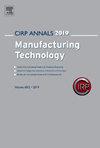硅晶片抛光过程中边缘形状的变化:卷边和卷起的形成
IF 3.2
3区 工程技术
Q2 ENGINEERING, INDUSTRIAL
引用次数: 0
摘要
硅晶片的边缘形状对于优化设备制造至关重要。在抛光工艺中,必须根据工艺的具体要求,将硅片加工成平面或卷边形状。然而,传统工艺通常会产生卷边形状。本研究确定了影响抛光过程中边缘形状变化的因素。通过抛光实验,研究了初始边缘形状以及晶片和抛光垫之间的接触状态对去除分布的影响。并提出了调整所产生的边缘形状的方法。本文章由计算机程序翻译,如有差异,请以英文原文为准。
Changes in edge shape during silicon wafer polishing: Roll-off and roll-up formation
The edge shape of a silicon wafer is crucial for optimal device manufacturing. In polishing processes, it is necessary to form wafers into either a flat or roll-up shape, depending on the specific requirements of the process. However, the conventional process typically results in a roll-off shape. This study identifies the factors that influence a change in the edge shape during polishing. Polishing experiments were conducted to examine the effects of the initial edge shape and contact state between the wafer and polishing pad on the removal distribution. An approach for adjusting the resulting edge shapes was proposed.
求助全文
通过发布文献求助,成功后即可免费获取论文全文。
去求助
来源期刊

Cirp Annals-Manufacturing Technology
工程技术-工程:工业
CiteScore
7.50
自引率
9.80%
发文量
137
审稿时长
13.5 months
期刊介绍:
CIRP, The International Academy for Production Engineering, was founded in 1951 to promote, by scientific research, the development of all aspects of manufacturing technology covering the optimization, control and management of processes, machines and systems.
This biannual ISI cited journal contains approximately 140 refereed technical and keynote papers. Subject areas covered include:
Assembly, Cutting, Design, Electro-Physical and Chemical Processes, Forming, Abrasive processes, Surfaces, Machines, Production Systems and Organizations, Precision Engineering and Metrology, Life-Cycle Engineering, Microsystems Technology (MST), Nanotechnology.
 求助内容:
求助内容: 应助结果提醒方式:
应助结果提醒方式:


